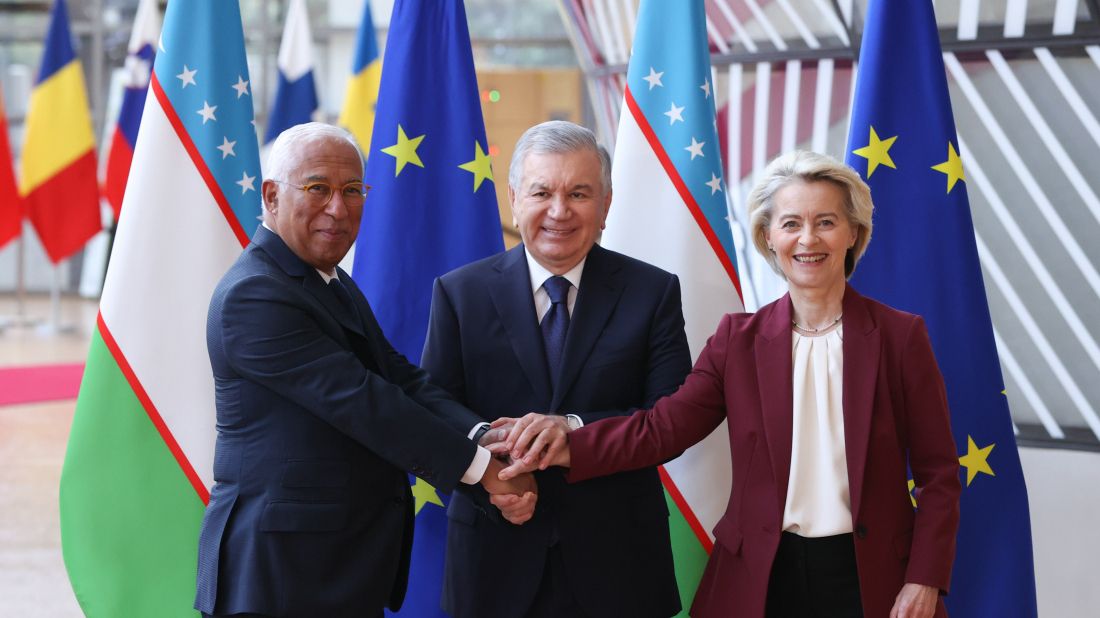live Israeli military says it has launched fresh strikes on Tehran and Beirut: All the latest news on the Iran strikes
The Israeli military has begun a new wave of strikes on Tehran, it said late on Monday. The strikes came after it issued...

Uzbekistan and the European Union (EU) have entered a new phase of cooperation and partnership with the signing of a new Enhanced Partnership and Cooperation Agreement (EPCA).
The EPCA marks a major step in bilateral relations and places Uzbekistan among the EU’s closest partners in Central Asia.
The signing which took place in Brussels, Belgium was attended by Uzbekistan's President Shavkat Mirziyoyev, President of the European Council Antonio Costa and President of the European Commission Ursula von der Leyen.
"Today we are delivering on that commitment by reinforcing our long-standing relationship with Uzbekistan," von der Leyen said in a statement.
The event comes after the first ever European Union–Central Asia Summit held in Samarkand earlier in the year.
The EU also announced a $12 billion investment initiative for regional connectivity and green transition projects during the summit.
Negotiations for the EPCA began in November 2018 and concluded in June 2022, with the text initialled in July of the same year. The EU Council authorised the signing in October 2024.
The agreement will replace the previous Partnership and Cooperation Agreement (PCA) that has served as the legal framework for relations since 1999.
The original PCA was signed in Florence on 21 June 1996 by the European Communities and their Member States, and the Republic of Uzbekistan. It entered into force on 1 July 1999 and provided the foundation for cooperation in political dialogue, economic relations, trade, and legal reform.
Under the PCA, the EU supported Uzbekistan’s transition to a market economy, while promoting dialogue on democracy, rule of law and human rights.
The agreement also created joint institutions, such as a Cooperation Council, to monitor implementation and strengthen coordination across sectors.
The forthcoming EPCA builds on this foundation, introducing new chapters on digitalisation, connectivity, environmental protection, and green growth, areas that reflect Uzbekistan’s ongoing reform agenda and its goal to align more closely with European standards.
Uzbekistan’s trade with the EU has been steadily increasing; from around $2.6 billion in 2017 to approximately $6.4 billion in 2024.
The new deal is expected to expand cooperation in trade, investment, and climate action, and further enhance Uzbekistan’s access to European markets.
Within the region, Kazakhstan’s EPCA with the EU entered into force in 2020, Kyrgyzstan signed its EPCA in 2024, and Tajikistan initialled its agreement in July 2025.
Armenia’s Comprehensive and Enhanced Partnership Agreement took effect in March 2021, while Azerbaijan continues to operate under its 1999 PCA, with trade turnover with the EU reaching about $24.8 billion in 2023.
Strategic Significance
As a landlocked country, Uzbekistan depends on transit routes through neighbours such as Kazakhstan and via the Caspian Sea through Azerbaijan to reach European and global markets.
The success of the EPCA will therefore rely on improving transport infrastructure, logistics, and regional connectivity.
For Uzbekistan, the agreement offers stronger integration into European value chains and new opportunities for investment and reform.
For the EU, it represents a strategic partnership with a reform-driven country at the heart of Central Asia.
Follow the latest developments and global reaction after the U.S. and Israel launched “major combat operations” in Iran, prompting retaliation from Tehran.
Saudi Arabia’s state oil giant Saudi Aramco closed its Ras Tanura refinery on Monday following an Iranian drone strike, an industry source told Reuters as Tehran retaliated across the Gulf after a U.S.-Israeli attack on Iranian targets over the weekend.
The Kremlin is utilising the recent United States and Israeli military strikes on Iran to validate its ongoing war in Ukraine. Russian officials are pointing to the escalation in the Middle East as evidence that Western nations do not adhere to international rules.
The Middle East crisis intensifies after the deadly attack on the compound of the Supreme Leader of Iran Ali Khamenei on Saturday that killed him, other family members and senior figures. Iran has launched retaliatory strikes on U.S. targets in the region.
Ayatollah Alireza Arafi has moved into a pivotal constitutional role following the death of Supreme Leader Ayatollah Ali Khamenei, becoming the clerical member of Iran’s temporary leadership council under Article 111 of the Constitution of the Islamic Republic of Iran.
U.S. first lady, Melania Trump chaired a UN Security Council meeting on children and education in conflict on Monday (2 March), a move criticised by Iran as hypocritical following U.S. and Israeli strikes that triggered a UN warning about risks to children.
Start your day informed with AnewZ Morning Brief. Here are the top news stories for the 3rd of February, covering the latest developments you need to know.
Canadian Prime Minister Mark Carney arrived in Australia on Tuesday (3 March), aiming to bolster relations between the two so-called "middle powers" amid what he has called a "rupture" in world order.
Former U.S. President Bill Clinton told lawmakers that President Donald Trump told him he had "some great times" with convicted sex offender Jeffrey Epstein before their relationship soured, according to a video released on Monday (2 March).
The U.S.-Iran crisis has entered its third day, with further strikes reported across the Middle East and the death toll rising. Oil prices have surged to levels last seen during the Covid-19 pandemic, raising fears of economic disruption and higher prices worldwide.
You can download the AnewZ application from Play Store and the App Store.

What is your opinion on this topic?
Leave the first comment